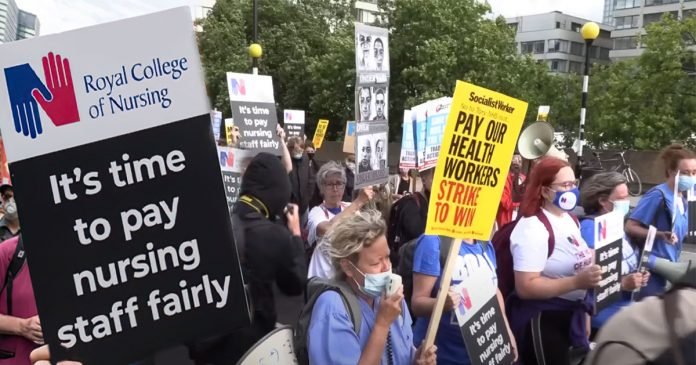Nurses to provide minimal staffing during strike action
In a bid to minimize the impact of the Royal College of Nursing (RCN) strike, union leaders have agreed that a small number of nurses will provide a minimal level of staffing in intensive care and trauma services on Sunday.
The strike, which begins at 20:00 BST and will run until the end of Monday, is the largest industrial action so far and comes after RCN members rejected a government offer of a 5% pay rise for 2023-24 and a one-off payment of at least £1,655 to top up last year’s salary.
The National Health Service (NHS) England said “positive discussions” had resulted in agreements with the RCN to ensure staff would provide cover for life and limb services.
These mitigations, however, “do not represent a return to standard staffing,” said Dame Ruth May, chief nursing officer for England. She warned patients to expect “disruptions and delays to services over the strike period.” RCN leadership had recommended members accept the government offer, but it was rejected by 54% to 46%.
The granting of exemptions to a small number of nurses was welcomed by Matthew Taylor, chief executive of the NHS Confederation, as “progress”. Health Secretary Steve Barclay, however, warned that the escalating strike action “risks patient safety” and “will be incredibly disruptive for patients.”
The strike comes ahead of a crucial meeting between unions, ministers, and NHS bosses on Tuesday. Meanwhile, the RCN spokesperson told the BBC that a “national agreement was reached on raising staffing levels in some key areas to preserve life and limb”, adding that this strike would be “more intense” than previous ones.
Opinion:
The plight of nurses in the UK has been a long-standing issue, with the pandemic only exacerbating the challenges they face. The fact that the RCN members have rejected the government’s offer of a 5% pay rise shows the depth of their frustration and anger.
Nurses are essential to the smooth running of the NHS, but the health of our nation and their contribution should be adequately recognised and remunerated.
However, the government’s reaction to the strike has been to warn of the risks to patient safety, rather than addressing the underlying issues that led to the strike in the first place. It is time for the government to listen to the concerns of nurses and take concrete steps to address them.
Support Independent Journalism Today
Our unwavering dedication is to provide you with unbiased news, diverse perspectives, and insightful opinions. We're on a mission to ensure that those in positions of power are held accountable for their actions, but we can't do it alone. Labour Heartlands is primarily funded by me, Paul Knaggs, and by the generous contributions of readers like you. Your donations keep us going and help us uphold the principles of independent journalism. Join us in our quest for truth, transparency, and accountability – donate today and be a part of our mission!
Like everyone else, we're facing challenges, and we need your help to stay online and continue providing crucial journalism. Every contribution, no matter how small, goes a long way in helping us thrive. By becoming one of our donors, you become a vital part of our mission to uncover the truth and uphold the values of democracy.
While we maintain our independence from political affiliations, we stand united against corruption, injustice, and the erosion of free speech, truth, and democracy. We believe in the power of accurate information in a democracy, and we consider facts non-negotiable.
Your support, no matter the amount, can make a significant impact. Together, we can make a difference and continue our journey toward a more informed and just society.
Thank you for supporting Labour Heartlands











